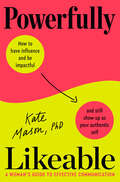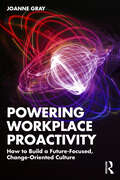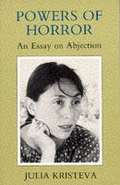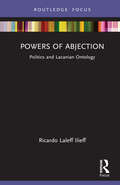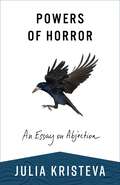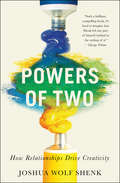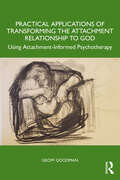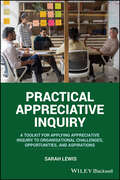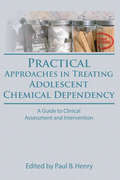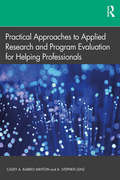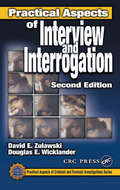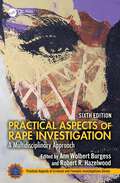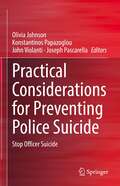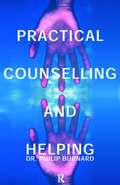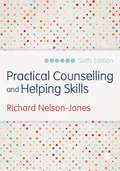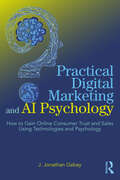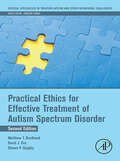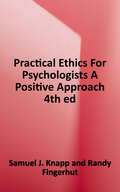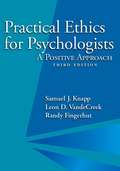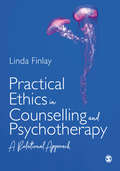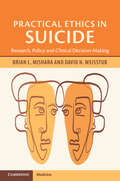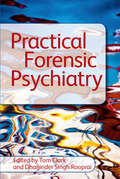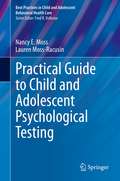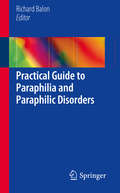- Table View
- List View
Powerfully Likeable: A Woman's Guide to Effective Communication
by Kate Mason PhDA groundbreaking new roadmap for female success—how to be influential, respected, and well-liked at work, at home, and beyond—from a leading business coach and communication expert.&“The competence-likeability bias is an absurd catch-22, but never fear! In this compelling, compassionate, and funny read, Kate Mason shows you how to break free.&”—Kim Scott, author of the New York Times bestseller Radical CandorWomen all over the world struggle to communicate with authority yet still be liked by a crowd. We strategize before meetings, second-guess in bathroom stalls, text outfit options to our best friends, and try to anticipate every possible variable. This tricky business is what world-champion debater and executive coach Kate Mason calls &“communicating while female&” and, frankly, it seems like it&’s impossible to get it right.Until now. In Powerfully Likeable, Mason explains that being influential and well-liked is not an either/or proposition. Furthermore, she shows that women don&’t have to imitate what men do; gaining respect doesn&’t mean having the loudest voice or the firmest handshake. Instead, the key is to choose communication tools that amplify what makes you unique—whether that be warmth, humor, competitiveness, or a love of data—and wield your power from a place of authenticity. From personal presentation style and negotiation to handling adversarial conversations and becoming your own best advocate, Mason offers a game-changing tool kit of strategies, including• scripts for owning your accomplishments instead of downplaying them and defending your ideas without being defensive• methods for using clear logic, evidence, and debate strategies to ask and answer clear questions without appearing &“difficult&”• tips for overcoming &“Imposing Syndrome&”—the disease of playing small and not taking up space—and channeling warmth as an alternative to deference in conversation• techniques to regulate your body language, voice, and words to find your true communicative powerA paradigm-shifting guide to dismantling and thinking beyond stereotypes, Powerfully Likeable will help you unleash your creative power and energy and embark on a journey of success on your terms.
Powering Workplace Proactivity: How to Build a Future-Focused, Change-Oriented Culture
by Joanne GrayEmpowering, customizable, and backed by organizational research, this book introduces the PROACTIVE work design model and diagnostic tool to help organizations create optimal conditions for proactivity at work to flourish.The pressures and expectations of 21st-century life have led to short-term, reactive behavior in the workplace, however, long-term business success relies on proactive behavior, which is self-directed, future-focused, and change-orientated. But proactivity does not occur in a vacuum – it is a complex, social process heavily affected by contextual and situational factors. With its distinct and flexible design model, this book solves the problem of ‘how’ to create the optimal conditions for proactivity at work to flourish, and to drive sustainability and competitive advantage. And its diagnostic feature recognizes that readers are time-pressured and may already be doing some things well within their organizations, so it offers a solution to their problems without having to read the entire book before they can start making a difference. Uniquely, this book recognizes how important it is for leaders to shape the work environment and to be a positive role model to stimulate employee proactive behavior.Intended as a practical resource, this book provides a range of evidence-based tools and techniques and includes insightful case studies that will be useful for leaders, managers, HR professionals, OD practitioners, and consultants who want to drive proactive behaviors within their organizations.
Powers Of Horror: An Essay on Abjection
by Julia Kristeva Leon S. RoudiezPowers of Horror is an excellent introduction to an aspect of contemporary French literature which has been allowed to become somewhat neglected in the current emphasis on para-philosophical modes of discourse.
Powers of Abjection: Politics and Lacanian Ontology (Psychoanalytic Political Theory)
by Ricardo Laleff IlieffIn this book, Ricardo Laleff Ilieff presents a new ontological understanding of politics through the writings of Julia Kristeva’s notion of “abjection” in dialogue with Sigmund Freud’s concept of “Unheimlich” and Jacques Lacan’s ontology “du rél”.Aimed at those who are interested in the politics-psychoanalytic “praxis”, Laleff Ilieff argues that the abject enables one to critically read conceptual developments that are central to contemporary thought. Examining the abject in sacrifice, war, and the One as articulated by contemporary thinkers such as Walter Benjamin, Judith Butler, Carl Schmitt, RenéGirard, Pierre Clastres, Giorgio Agamben, and Jacques Rancièe, Laleff Ilieff argues that abjection does not operate on the margins of the social but is what unveils the failure of all identity.Powers of Abjection provides new questions and insights into the relation between psychoanalysis and politics and is an invaluable resource to students and scholars.
Powers of Horror: An Essay on Abjection (European Perspectives: A Series in Social Thought and Cultural Criticism)
by Julia KristevaIn Powers of Horror, Julia Kristeva offers an extensive and profound consideration of the nature of abjection. Drawing on Freud and Lacan, she analyzes the nature of attitudes toward repulsive subjects and examines the function of these topics in the writings of Louis-Ferdinand Céline, Marcel Proust, James Joyce, and other authors. Kristeva identifies the abject with the eruption of the real and the presence of death. She explores how art and religion each offer ways of purifying the abject, arguing that amid abjection, boundaries between subject and object break down.
Powers of Two: How Relationships Drive Creativity
by Joshua Wolf ShenkThe power of collaboration, from Lennon and McCartney to Wozniak and Jobs: &“An inspiring book that also happens to be a great read&” (Daniel H. Pink, author of Drive). Throughout history, partners have buoyed each other to better work—though often one member is little known to the general public. (See Warren Buffett and Charlie Munger, or Vincent and Theo van Gogh.) Powers of Two draws on neuroscience, social psychology, and cultural history to present the social foundations of creativity, with the pair as its primary embodiment. Revealing the six essential stages through which creative intimacy unfolds, this book shows how pairs begin to talk, think, and even look like each other; how the most successful ones thrive on conflict; and why some cease to work together while others carry on. At once intuitive and deeply surprising, Powers of Two will reshape the way you view individuals, relationships, and society itself. &“A rare glimpse into the private realms of duos . . . A natural storyteller.&” —The New York Times &“A book about magic, about the Beatles, about the chemistry between people, about neuroscience, and about the buddy system; it examines love and hate, harmony and dissonance, and everything in between . . . Wise, funny, surprising, and completely engrossing.&” —Susan Orlean &“We sometimes think of creativity as coming from brilliant loners. In fact, it more often happens when bright people pair up and complement each other. Shenk&’s fascinating book shows how to spark the power of this phenomenon.&” —Walter Isaacson &“Surprising, compelling . . . Shenk banishes the idea of solitary genius by demonstrating that our richest art and science come from collaboration: we need one another not only for love, but also for thinking and imagining and growing and being.&” —Andrew Solomon
Practical Applications of Transforming the Attachment Relationship to God: Using Attachment-Informed Psychotherapy
by Geoff GoodmanPractical Applications of Transforming the Attachment Relationship to God discusses four distinct attachment relationships to the God of personal spiritual experience and considers how each of these relationships has implications for working with clients in psychotherapy.Geoff Goodman uses Attachment-Informed Psychotherapy (AIP) to explore the connection between a relationship to God and a relationship to caregivers during childhood. By analyzing the attachment relationships evident in the lives of four public figures—human rights activist Coretta Scott King, Jewish Holocaust victim Anne Frank, Alcoholics Anonymous co-founder Bill W., and founder of psychoanalysis Sigmund Freud—this book demonstrates how their attachment relationships with their caregivers during childhood helped to determine the quality of their attachment relationship (or nonrelationship) to God in later life. Goodman demonstrates how to use AIP to work with these attachment relationships, formulating a psychotherapeutic treatment plan for each one with the goal of restoring wholeness and unity.This book will be a valuable resource for psychoanalysts, psychotherapists, and marriage and family therapists in practice and in training.
Practical Appreciative Inquiry: A Toolkit for Applying Appreciative Inquiry to Organisational Challenges, Opportunities, and Aspirations
by Sarah LewisCreate a shared vision built on core strengths and values to improve your organization Appreciative Inquiry (AI) equips leaders with a revolutionary approach to achieving positive organizational change. Rather than the traditional managerial method of first evaluating a problem and then proposing a solution, AI teaches you to ask, “What is going right here, and how can we grow more of it?” In Practical Appreciative Inquiry, expert organizational consultant and facilitator Sarah Lewis teaches you how to apply the AI methodology in an array of management situations. Step by step, this practice-oriented guide helps you leverage the versatility and flexibility of Appreciative Inquiry to make rapid, positive change. Covering all key aspects of AI, this concise yet comprehensive resource provides a wealth of ideas and activities designed to develop an AI leadership mindset, build resilience within your organization, motivate performance, increase team innovation, support change processes, create AI interventions, and much more. Each chapter features discussion questions, teaching exercises, links to online resources, and real-world case studies of AI in practice. Whether an experienced practitioner or a newcomer to change management, Practical Appreciative Inquiry: A Toolkit for Applying Appreciative Inquiry to Organisational Challenges, Opportunities, and Aspirations is a must-read for all leaders, managers, and team members wanting to improve their organization, as well as consultants, trainers, and organizational development experts interested in AI.
Practical Approaches in Treating Adolescent Chemical Dependency: A Guide to Clinical Assessment and Intervention
by Bruce Carruth Paul B HenryHere at last is a comprehensive volume on the often-ignored but vitally important subject of care for the chemically dependent adolescent. The most current treatment approaches are included, all focused on the unique needs of this population. For the first time, a book on adolescent chemical dependence illustrates, in a practical way, the major issues of on-going care--from intervention and assessment through aftercare and relapse. Written by professionals who have worked extensively with chemically dependent youth, Practical Approaches in Treating Adolescent Chemical Dependency will be appreciated by all in the field of chemical dependency--administrators, treatment directors, and certified addictions counselors, as well as by social workers, family therapists, school guidance counselors, and student assistance personnel.BACKCOVER COPY The treatment of alcoholism and drug use is a relatively young field that has developed only in the past 25 years. And as most of the expertise, efforts, and money have been targeted toward the chemically dependent adult population, the use and abuse of substances among young people has skyrocketed.Here at last is a comprehensive book on the often-ignored but vitally important subject of care for the chemically dependent adolescent. The most current treatment approaches are included, all focused on the unique needs of this population. For the first time, a book on adolescent chemical dependence illustrates, in a practical way, the major issues of on-going care--from intervention and assessment through aftercare and relapse. Written by professionals who have worked extensively with chemically dependent youth, Practical Approaches in Treating Adolescent Chemical Dependency features: a comprehensive overview of the dynamics of adolescence and the destructive impact that chemicals have upon kids a description of adolescents who are at risk for chemical dependency guidelines for making accurate assessments of chemically dependent adolescents successful programs and interventions that involve communities, schools, and families special insights into treating chemically dependent minority youth a review of the stages of recovery adapted to the developmental needs of adolescents a look at support groups that best facilitate the recovery process among adolescents much more
Practical Approaches to Applied Research and Program Evaluation for Helping Professionals
by Casey A. Barrio Minton A. Stephen LenzPractical Approaches to Applied Research and Program Evaluation for Helping Professionals is a comprehensive textbook that presents master’s-level counseling students with the skills and knowledge they need to successfully evaluate the effectiveness of mental health services and programs. Each chapter, aligned with 2016 Council for Accreditation of Counseling and Related Educational Programs (CACREP) standards, guides counseling students through study design and evaluation fundamentals that will help them understand existing research and develop studies to best assess their own applied research questions. Readers will learn the basics of research concepts as applied to evaluative tasks, the art of matching evaluative methods to questions, specific considerations for practice-based evaluative tasks, and practical statistical options matched to practice-based tasks. Readers can also turn to the book’s companion website to access worksheets for practitioner and student planning exercises, spreadsheets with formulas for basic data analysis, a sample database, PowerPoint outlines , and discussion questions and activities aligned to each chapter.
Practical Aspects of Interview and Interrogation (ISSN)
by Shane G. Sturman L. Wayne Hoover David E. Zulawski Douglas E. WicklanderBuilding on the foundation of the bestselling first edition, Practical Aspects of Interview and Interrogation, Second Edition expands its coverage to include discussions of false confessions, telephone interviewing, field interviewing, sexual harassment interviewing, confronting the alleged harasser, pre-employment interviewing, new legal aspects, juvenile interviewing, common mistakes, and frequently asked questions. Useful in both the law enforcement and private sectors, this work allows readers to deal effectively with the complex problems of interviewing and interrogating victims, witnesses, suspects, and even prospective employees.
Practical Aspects of Rape Investigation: A Multidisciplinary Approach, (Practical Aspects of Criminal and Forensic Investigations)
by Robert R. Hazelwood Ann BurgessThe latest sixth edition of Practical Aspects of Rape Investigation is a fully updated, comprehensive volume on investigative procedures and victim-oriented case management for professionals assisting victims of rape and sexual assault.Rape and sexual assault cases have a devastating societal impact, particularly among the vulnerable populations most affected, including women, children, the elderly, minorities, and members of the LGBTQ+ communities. Such cases are all too common and, unfortunately, the number of cases continues to rise. As such, the need for a current reference on the topic has never been more pressing.Edited by Ann Wolbert Burgess—the subject of Hulu’s 2024 documentary series Mastermind: To Think Like a Killer, and an internationally recognized researcher and pioneer in the assessment and treatment of victims of trauma and abuse—this book covers various topics contributed to by experts from a broad range of fields. Leading academics, researchers, and investigative professionals address the problem of rape and sexual assault holistically, focusing on the core principles of real-world investigative techniques, behavioral profiling, investigative strategies and techniques, social worker involvement, and victimology.When a rape case goes undetected or unreported, a violent offender remains on the streets with the opportunity to reoffend—often repeatedly. Because victims are frequently reluctant to speak out or act in such cases, this book aims to raise awareness and, ultimately, decrease the number of silent victims and improve rape-investigative capabilities and outcomes.Practical Aspects of Rape Investigation, Sixth Edition provides the essential tools and techniques for professionals to best serve, and advocate for, victims. It continues to serve as an invaluable reference for students, legal professionals, and case managers, and as a blueprint for investigators and law enforcement professionals on case management best practices.
Practical Considerations for Preventing Police Suicide: Stop Officer Suicide
by Konstantinos Papazoglou Olivia Johnson John Violanti Joseph PascarellaThis book takes an in-depth look at the phenomenon of police officer suicide. Centered on statistical information collected from cases of officer suicide from 2017 to 2019, this volume helps readers understand the circumstances surrounding death by suicide amongst law enforcement personnel and makes recommendations for identification and prevention. Through interview and case presentations, this volume examines the lives and last days and weeks of several officers, using findings from social media, departmental surveys, medical examiner reports, toxicology reports and interviews with loved ones and colleagues to create a psychological autopsy. With 14 chapters contributed by former law enforcement, researchers, and mental health professionals, it addresses national, state, and local policy implications and strategies, presenting a theory for better understanding and preventing the phenomenon of officer suicide. This volume will be of interest to researchers in policing, to law enforcement and first responder leadership and administrative professionals, and to mental health practitioners and clinicians working with this unique population
Practical Counselling and Helping
by Philip BurnardPractical Counselling and Helping is a practical, jargon-free guide to counselling. It offers clear information about how counselling and helping may be put into practice, whilst acknowledging and discussing its limitations.Contents include:* what is counselling and helping?* basic counselling and helping strategies* handling difficult situations* further personal development.Drawing from a range of counselling methods, and offering a useful and detailed reading list, Practical Counselling and Helping will appeal to all students in the health professions and to all those professionals requiring a clear account of how they might improve their own communication skills.
Practical Counselling and Helping Skills: Text and Activities for the Lifeskills Counselling Model
by Richard Nelson-JonesThis sixth edition provides a step-by-step guide to using counselling and helping skills with confidence and proficiency. The author's three-stage model of counselling - relating, understanding and changing - is designed to facilitate developing lifeskills in clients and to help them to change how they feel, think, communicate and act. It includes new chapters on 'Technology mediated counselling and helping', with updated research and references throughout. Using practical activities and case examples, the book takes you beyond the basics to more advanced skills, making it an essential companion for all counselling skills courses. Richard Nelson-Jones has many years' experience as a counsellor, trainer and psychotherapist. His books have helped train thousands of counsellors and helpers worldwide. He is a Fellow of the British and Australian Psychological Societies and of the British Association for Counselling and Psychotherapy.
Practical Digital Marketing and AI Psychology: How to Gain Online Consumer Trust and Sales Using Technologies and Psychology
by J. Jonathan GabayPractical Digital Marketing and AI Psychology explores how successful brands utilise both psychology and cutting-edge artificial intelligence technologies to maximise digital marketing strategies.Psychology has long been a foundation for successful marketing strategies, and evolving AI technologies are opening up new opportunities for marketers to help brands build trust and loyalty online. In this exceptional book, award-winning writer Jonathan Gabay delves into fascinating psychological digital marketing techniques and concepts, explaining the practical psychology and science you need to lift your marketing career to the next level. Gabay explores how new technologies can be harnessed to increase their impact significantly. The book provides practical tips and contemporary best-practice examples, including prompt engineering, the psychology behind mission statements and logo design, gamification, the possibilities and pitfalls of social media, among many more areas that will ensure your brand is trusted, valued, and desired.This definitive book is perfect for marketing students up to PhD level and digital marketing, PR, and sales professionals looking for a fascinating, compelling read, packed with ideas and examples, that combines academic excellence with practical advice – all written and presented in a highly accessible style.
Practical Ethics for Effective Treatment of Autism Spectrum Disorder
by David J. Cox Shawn P. Quigley Matthew T. BrodheadPractical Ethics for Effective Treatment of Autism Spectrum Disorder, Second Edition is for behavior analysts working directly with, or supervising those who work with, individuals with autism. The book addresses the principles and values that underlie the Behavior Analyst Certification Board's® Professional and Ethical Compliance Code for Behavior Analysts and factors that affect ethical decision-making. In addition, the book addresses critical and under-discussed topics, including scope of competence, evidence-based practice in behavior analysis, how to collaborate with professionals within and outside one's discipline, and how to design systems of ethical supervision and training customized to unique treatment settings. Across many of the topics, the authors also discuss errors students and professionals may make during analyses of ethical dilemmas and misapplications of ethical codes within their practice. <P><P>New to this revision are chapters on Quality Control in ABA Service Delivery, Ethical Issues in ABA Business Management and Standardizing Decision-making in ABA Service Delivery. - Reviews new BACB Ethics Code for Behavior Analysis - Discusses factors that affect ethical decision-making - Describes how to create systems for teaching and maintaining ethical behavior - Discusses how to identify your own scope of competence in autism treatment - Examines the process of evidence-based practice and how it can be applied to behavior-analytic treatment for autism - Addresses the importance of interdisciplinary collaboration and how to be a good collaborator - Reviews common mistakes that students and supervisors make when analyzing ethical dilemmas, along with common misapplications of ethical codes - Includes new chapters on standardized decision-making and quality control in ABA service delivery
Practical Ethics for Psychologists: A Positive Approach
by Samuel J. Knapp Randy FingerhutThe fourth edition of this seminal book, guided by the APA Ethics Code and a social justice perspective, shows psychologists how to achieve higher standards of ethical practice in their everyday work. Advocating a positive, proactive approach to ethics, Samuel Knapp and Randy Fingerhut go beyond the minimal ethical requirements in clinical practice, research, education, forensic psychology, consultation, and other areas. Through vivid case examples, they explore ethical dilemmas that psychologists must face regarding issues including informed consent, confidentiality, maintaining competence, and protecting the welfare of clients and society at large. The authors present three models to guide psychologists: - the ethics acculturation model for balancing personal and professional ethics; - the five-step decision-making model for navigating complex ethical quandaries; and - the quality enhancement model for managing risk, particularly with patients who may cause harm to themselves or others. This edition offers an enhanced focus on social justice as an ethical responsibility, expanded guidelines related to healthcare technologies, and greater emphasis on psychologist self-care. Psychologists will learn how to collaborate with and empower patients, research subjects, students, and others impacted by their work, ensuring that they are actively engaged in ethical decisions.
Practical Ethics for Psychologists: A Positive Approach
by Samuel J. Knapp; Leon D. VandeCreek; Randy FingerhutPatient Confidentiality; Inappropriate Relationships with Patients; Financial Issues; Informed Consent; Forensic and legal issues.
Practical Ethics in Counselling and Psychotherapy: A Relational Approach
by Linda FinlayThis highly engaging book introduces readers to the ethical dilemmas that therapists may face in their therapeutic practices. By mapping the counselling process from beginning to end, it focuses on key ethical issues such as informed consent, confidentiality, boundaries, the use of touch and dual relationships. It draws on a series of in-depth case studies illustrating ethical dilemmas, and presents the reader with reflective questions at the end of each example. The book covers: The Context of Relational Ethics - Relational Ethics within the Therapeutic Relationship - Exploring the complex judgement demanded by the therapeutic process, and looking at how therapy needs to be situation specific.
Practical Ethics in Counselling and Psychotherapy: A Relational Approach
by Linda FinlayAre you sometimes challenged by how to apply ethical principles in your own practice? Looking to understand what ethical practice can look like from different theoretical standpoints? Linda Finlay takes you on an exploration of ethical therapeutic practice. She highlights how therapeutic decisions depend on the social and relational context and vary according to your theoretical lens. She provides you with guidance on how to engage in therapy relationally while remaining professional, ethical and evidence-based. Split over three parts this book takes you through: - The Context of Relational Ethics - introducing you to the foundational ideas, and considering how professional codes are applied within therapy - Relational Ethics within the Therapeutic Relationship – exploring the complex judgements demanded by the therapeutic process, and looking at how therapy needs to be situation specific - Relational Ethics in Practice – five extended, fictional case studies demonstrate relational ethics in practice, and discuss the issues raised.
Practical Ethics in Suicide: Research, Policy and Clinical Decision-Making
by Brian L. Mishara David N. WeisstubWhen and how forcefully must we intervene to save a life, and when should we respect the will to die? This book presents alternative ethical paradigms to understand contemporary challenges in suicide research, prevention, practices, and policies, including challenges in the expanding legalization of euthanasia and assisted suicide ('medical assistance in dying'). Drawing on case studies and philosophical approaches, analysis focuses on decision-making when we are faced with questions about obligations to help and intervene in suicidal situations. Chapters cover moral dilemmas in rescue policies, ethical challenges in suicide research, civil and legal considerations, and similarities and differences with accessing medical assistance in dying. Discussion is grounded in contemporary debates, addressing important issues such as if we should continue to hospitalize people to protect them from self-harm, or control access to 'dangerous' suicide content online? This book is unique in its focus on the practical concerns of mental health professionals, helplines, researchers, policy makers, and programme planners who are faced with ethical challenges in suicidology and suicide prevention.
Practical Forensic Psychiatry
by Tom Clark Dharjinder Singh RoopraiSuccinct, structured, and focused, this book concentrates on the key facts and practical day-to-day issues vital to forensic psychiatry.Includes fact-oriented practical advice and clinically relevant examples Reflects current practice and the latest laws Provides tips on testifying in legal mattersFeatures a clear bullet point style to help readers
Practical Guide to Child and Adolescent Psychological Testing (Best Practices in Child and Adolescent Behavioral Health Care)
by Nancy E. Moss Lauren Moss-RacusinThis book explains the psychological assessment process and reviews the origins of psychological testing, referral and testing processes, and prominent psychological assessment instruments. Most important, this book details how to evaluate testing data and use them to understand an individual’s needs and to inform interventions and treatments.This book addresses specific domains of psychological assessment, including:· Intelligence and academic achievement.· Speech-language and visual-motor abilities.· Memory, attention/concentration, and executive functioning.· Behavioral and social-emotional functioning.· Developmental status.Practical Guide to Child and Adolescent Psychological Testing is an essential resource for clinicians, primary care providers, and other practitioners as well as researchers, professors, and graduate students in the fields of child, school, and developmental psychology, pediatrics and social work, child and adolescent psychiatry, primary care medicine, and related disciplines.
Practical Guide to Paraphilia and Paraphilic Disorders
by Richard BalonThis book is a concise, practical guide to both paraphilia and paraphilic disorders as defined by the DSM-5 guidelines. Written by experts in the field, the chapters cover the different types of paraphilic disorder as well as the cutting-edge, emerging issues such as online sex. Unlike any other book on the market, the text also covers the most successful treatment strategies, include the therapeutic, hormonal, and psychopharmacological approaches. The book also discusses the ethical, legal, and cultural issues that are common complications when dealing with paraphilic disorders. Many chapters feature an introduction, diagnostic criteria, summary of evidence, clinical example, recommendations, conclusion, and references. Practical Guide to Paraphilia and Paraphilic Disorders is a valuable resource for psychiatrists, psychologists, residents, and all medical professionals working with patients who may suffer from paraphilia and/or paraphilic disorders.
